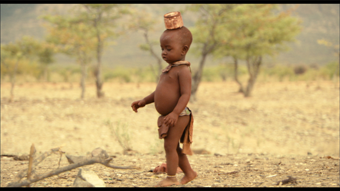To Walk is Noble
A recent post on How We Montessori addressed the importance of letting toddlers walk when they show enthusiasm for it. Yes, a walking toddler slows you down, but what's your hurry? Parents are always claiming that they want to stimulate their child's intelligence, and yet they put a stop to the ONE activity that will most enhance cognitive growth - purposeful movement.
It has always driven me NUTS to see three-year olds being pushed in strollers. Have you looked at a child's face when he's sitting in a stroller? Is he engaged, curious, excited? Or is he passive, bored, and even humiliated? What do you think he's learning while being pushed around? What messages are we sending them when we strap them down?
I hope you've seen the movie "Babies" (if you haven't, what are you waiting for???). It features a baby girl from a goat-herding tribe in Namibia. From the moment the child starts to walk, the mother is never shown picking up the child again.
In one scene, the mother walks slowly next to the toddling girl, giving her sensitive feet time to become accustomed to the rocky ground. The child's discomfort is obvious, and yet the mother's presence seems to be telling her: "You are strong, I know you can do this." In another scene, the mother bends down to nurse the girl while the child is standing. In a third scene, the toddler is trying to balance a can on her head while walking - all this, while the three other same-aged babies in the movie (from Japan, Mongolia, and the U.S.) are still as wobbly on their feet as a newborn foal.
Dr. Montessori writes: "It is often we who obstruct the child, and so become responsible for anomalies that last a lifetime." By putting toddlers in strollers, we are giving them the message that walking is a chore, that our will is more powerful than theirs, and that their presence is slowing us down. By letting them walk, we are encouraging them to "coordinate those movements which play a necessary part in [their] mental life, so as to enrich the practical and executive sides of it."
 http://www.toobigforstroller.com/
http://www.toobigforstroller.com/
It has always driven me NUTS to see three-year olds being pushed in strollers. Have you looked at a child's face when he's sitting in a stroller? Is he engaged, curious, excited? Or is he passive, bored, and even humiliated? What do you think he's learning while being pushed around? What messages are we sending them when we strap them down?

I hope you've seen the movie "Babies" (if you haven't, what are you waiting for???). It features a baby girl from a goat-herding tribe in Namibia. From the moment the child starts to walk, the mother is never shown picking up the child again.
In one scene, the mother walks slowly next to the toddling girl, giving her sensitive feet time to become accustomed to the rocky ground. The child's discomfort is obvious, and yet the mother's presence seems to be telling her: "You are strong, I know you can do this." In another scene, the mother bends down to nurse the girl while the child is standing. In a third scene, the toddler is trying to balance a can on her head while walking - all this, while the three other same-aged babies in the movie (from Japan, Mongolia, and the U.S.) are still as wobbly on their feet as a newborn foal.
Dr. Montessori writes: "It is often we who obstruct the child, and so become responsible for anomalies that last a lifetime." By putting toddlers in strollers, we are giving them the message that walking is a chore, that our will is more powerful than theirs, and that their presence is slowing us down. By letting them walk, we are encouraging them to "coordinate those movements which play a necessary part in [their] mental life, so as to enrich the practical and executive sides of it."
Executive functions - the ability to plan, prioritize, initiate, inhibit, monitor, correct, control and change one's own behavior - are honed through the simple act of walking!
Whenever I see a child strapped down to a stroller, I remember one of my Children's House trainers. She was an elegant older lady who floated like a butterfly but stung like a bee. She told us that whenever she sees a child in a stroller, she approaches the parents and asks: "Can your child walk?" Upon receiving an affirmative answer, she replies: "Then why doesn't he?" http://www.toobigforstroller.com/
http://www.toobigforstroller.com/Categories
- 3-6 (8)
- 6-9 (26)
- 9-12 (8)
- Positive Discipline (2)
- Conscious Parenting (12)
- Montessori Curriculum (9)
- Preparation of the Adult (14)
- Preparation of the Environment (11)
- Montessori Principles (11)
- Montessori Homeschooling (20)
- Language Arts (3)
- Math (3)
- Geography (2)
- Biology (1)
- History (2)
- Practical Life (1)
- Montessori Stories (4)

4 comments
Leave a comment